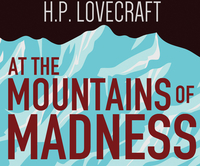Take a photo of a barcode or cover
Really liked this! Lovecraft's prose is...well, what it is (not bad, necessarily, but definitely its own style and one not always easy for us with English as a second language). Therefore I am grateful to people who make graphic novels out of Lovecraft's stories - I get to experience them all over again, in a different way!
"At the Mountains of Madness" is one of my favorite Lovecraft stories, so I greatly enjoyed this version of it on that merit alone. But the art here is great and the parts of the story they chose to include - both in terms of scenes and in terms of dialogue - are wonderful. The only downside is that there can't be as much slow build-up in a graphic novel, though the build-up there is, is delightful!
"At the Mountains of Madness" is one of my favorite Lovecraft stories, so I greatly enjoyed this version of it on that merit alone. But the art here is great and the parts of the story they chose to include - both in terms of scenes and in terms of dialogue - are wonderful. The only downside is that there can't be as much slow build-up in a graphic novel, though the build-up there is, is delightful!
Despite our speed, they were very slow in gaining prominence; hence we knew that they must be infinitely far off, and visible only because of their abnormal height. Little by little, however, they rose grimly into the western sky; allowing us to distinguish various bare, bleak, blackish summits, and to catch the curious sense of phantasy which they inspired as seen in the reddish antarctic light against the provocative background of iridescent ice-dust clouds. In the whole spectacle there was a persistent, pervasive hint of stupendous secrecy and potential revelation; as if these stark, nightmare spires marked the pylons of a frightful gateway into forbidden spheres of dream, and complex gulfs of remote time, space, and ultra-dimensionality. I could not help feeling that they were evil things—mountains of madness whose farther slopes looked out over some accursed ultimate abyss.
It is maybe the perfect encapsulation of my frustration with Lovecraft that he kept typing for one more useless sentence after that delicious description. The man was an awful writer. And this story does suffer from all his tics: The use of his own Mythos as a crutch. Latching onto other authors and artists instead of telling his own story. The word 'Cyclopean', which I would pay money to never see in print again (but hey I have more Lovecraft to read so not happening). And we've gone from never seeing the horror to plopping really unlikely xenothropological treatises on their homes and gardens into the middle of the action. Not to mention garish, hard to visualize but so very exact descriptions of alien biology. And yet. Yet. Here, in the midst of this unlikely wander across Antarctica, right in the height of an actually really nail biting passage, something truly transcendent happens. Something that rose up out of Lovecraft's whole edifice of works so far and simply took my breath away. Lovecraft, who hated everything that is not white and patrician and New English, who could hardly stand to look at people who are not exactly like himself, allows his protagonist one momentof perfect empathy with the Other . (Mind you, I don't know if this moment will have the same impact for someone who hasn't just slogged through the three quarters of the man's work that was written before this story, but I suspect it will still work.) This, along with the protagonist's genuine love for his companions, and the especially poignant portraits of Lake and Danforth, combine to lift this short work into something almost sublime. I really don't recommend you read much Lovecraft, but this one is worth your time. I'm off to look for a good audio performance. I read the last couple of sections aloud and it really enhanced the experience, I think.
(Freebie: Since I already had to look it up, here is one of the paintings Lovecraft thought everyone ought to see:)

"Crossroad of Christ and Buddha" by Nicholas Roerich
Reviewed September 16, 2017.
It is maybe the perfect encapsulation of my frustration with Lovecraft that he kept typing for one more useless sentence after that delicious description. The man was an awful writer. And this story does suffer from all his tics: The use of his own Mythos as a crutch. Latching onto other authors and artists instead of telling his own story. The word 'Cyclopean', which I would pay money to never see in print again (but hey I have more Lovecraft to read so not happening). And we've gone from never seeing the horror to plopping really unlikely xenothropological treatises on their homes and gardens into the middle of the action. Not to mention garish, hard to visualize but so very exact descriptions of alien biology. And yet. Yet. Here, in the midst of this unlikely wander across Antarctica, right in the height of an actually really nail biting passage, something truly transcendent happens. Something that rose up out of Lovecraft's whole edifice of works so far and simply took my breath away. Lovecraft, who hated everything that is not white and patrician and New English, who could hardly stand to look at people who are not exactly like himself, allows his protagonist one moment
(Freebie: Since I already had to look it up, here is one of the paintings Lovecraft thought everyone ought to see:)

"Crossroad of Christ and Buddha" by Nicholas Roerich
Reviewed September 16, 2017.
adventurous
dark
mysterious
tense
medium-paced
Plot or Character Driven:
Plot
Strong character development:
No
Loveable characters:
No
Diverse cast of characters:
No
Flaws of characters a main focus:
No
adventurous
medium-paced
Plot or Character Driven:
Plot
Strong character development:
No
Diverse cast of characters:
No
Flaws of characters a main focus:
No
An interesting travelogue but it is not horror. We only know it is meant to be terrifying because the narrator tells us so. Multiple times. I found the writing to be at times too... much. As if, if it hadn't been Lovecraft, an editor would have stricken many passages as being self indulgent. And to that point, how many times can you fit the phrase "mountains of madness" into a novella?
That said, I did enjoy it. It hints enough to make you curious about the rest of this mythos if you aren't already familiar. I spent a good deal of time after reading looking up illustrations - it just stays with you.
That said, I did enjoy it. It hints enough to make you curious about the rest of this mythos if you aren't already familiar. I spent a good deal of time after reading looking up illustrations - it just stays with you.
challenging
mysterious
tense
slow-paced
In the mouth of another author, the story of an oppressed species--whose evolution was carefully guided by the oppressive species so as to ensure their future enslavement--that forms a revolution and brutally attacks their oppressors would have been an interesting exploration of oppression, justice, and "survival of the fittest" evolution. In the mouth of H.P. Lovecraft, who had a history of Nazi sympathies and who clearly sided with the oppressive species in his story (the Elder Ones), the story gains an unsavory and disturbing character different from that which Lovecraft intended.
That said, the use of cosmic horror was surprisingly thoughtful and complex, and the atmosphere of the story was excellent. I found myself engaged in the story, even when I might rather not have been.
That said, the use of cosmic horror was surprisingly thoughtful and complex, and the atmosphere of the story was excellent. I found myself engaged in the story, even when I might rather not have been.
adventurous
dark
mysterious
slow-paced






